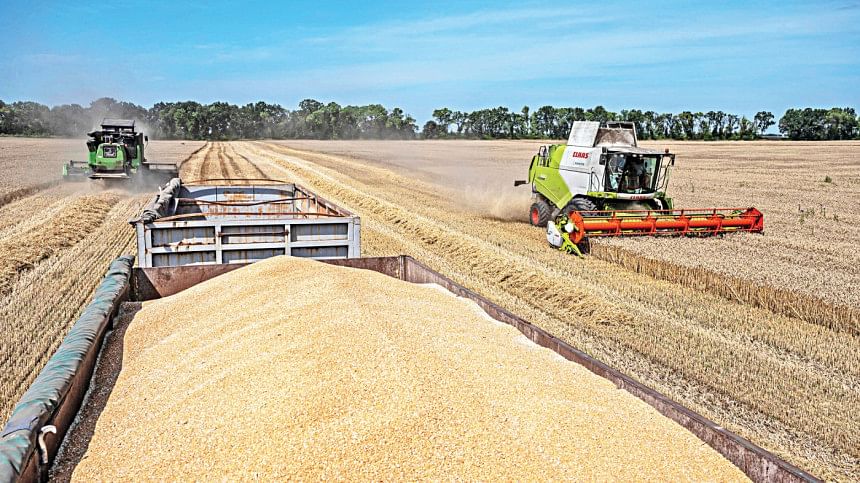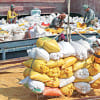Wheat prices may cool off in local market

The price of wheat in Bangladesh may come down as its export from Ukraine has resumed following an agreement with Russia.
Prior to the Russia-Ukraine war, 40 per cent of Bangladesh's wheat import was made from the two countries.
After a stalemate of about five months, the first ship loaded with wheat started its journey to Turkey from Ukraine over the Black Sea on Monday.
Importers and wholesalers said wheat prices increased by Tk 300-Tk 400 per maund (around 37 kilogrammes) after the war began and India restricted wheat exports from February this year.
Before the conflict broke out in late February, Indian and Canadian wheat sold for Tk 900 and Tk 1,100 per maund respectively.
According to wholesale traders of Khatunganj, yesterday's prices were Tk 1,450 and Tk 2,100 respectively.
The traders said the price of the product has remained normal for the last one week.
However, at the end of July, the price of each variety decreased by Tk 100 following the agreement and price drops in the international market.
"The domestic wheat market was not showing that much of a change despite the price fall in the international market and resumption of exports from Ukraine due to the higher exchange rate of the dollar," Abul Bashar Chowdhury, chairman of BSM Group, told The Daily Star.
"The bank LC was opened at the time of import stage at Tk 87 per dollar, but the dollar rate increased to Tk 97 to Tk 106 per dollar during payment of the consignments. So, the price of the product has not reduced as per international market," he said.
He said it would take one to one and a half months for these products to arrive in the country if letters of credit were opened now. Then the supply of the product will increase as well as the price will decrease when the goods enter the market, he added.
According to the National Board of Revenue, Bangladesh imported a total of 14.66 lakh tonnes of wheat in first eight months of last fiscal year of 2021-22 till February before the war.
In this period, around 40 per cent of the imported wheat came from Russia and Ukraine.
According to importers, the purchase of wheat and wheat products has grown at a rate of 10-15 per cent almost every year over the past decade due to increased demand in the domestic market.
But in the last two years, the import of the goods declined due to a drop in demand of the goods and a global price hike during the pandemic.
The country's annual demand for wheat stands at around 70 lakh tonnes to 75 lakh tonnes, 85 per cent of which is met through imports, according to data from the Bangladesh Bureau of Statistics and Department of Agricultural Extension.
In Dhaka, retail prices of unpackaged wheat flour declined 3.5 per cent to Tk 40-42 per kilogramme yesterday from Tk 40-Tk 45 a kilogramme a month ago.
Prices of packaged wheat flour dropped 6.6 per cent to Tk 48-Tk 50 a kilogramme yesterday from that a month ago, according to prices data compiled by the Trading Corporation of Bangladesh.

 For all latest news, follow The Daily Star's Google News channel.
For all latest news, follow The Daily Star's Google News channel. 








Comments